

Learn about Jupiter. Kid's Cosmos: Facts about Jupiter. Jupiter is the largest planet in the solar system.
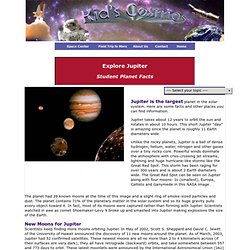
Here are some facts and other places you can find information. Jupiter takes about 12 years to orbit the sun and rotates in about 10 hours. This short Jupiter "day" is amazing since the planet is roughly 11 Earth diameters wide. Unlike the rocky planets, Jupiter is a ball of dense hydrogen, helium, water, nitrogen and other gases over a tiny rocky core. Powerful winds dominate the atmosphere with criss-crossing jet streams, lightning and huge hurricane-like storms like the Great Red Spot.
The planet had 39 known moons at the time of this image and a slight ring of smoke-sized particles and dust. Jupiter, Jupiter Information. Jovian Giant The most massive planet in our solar system, with four planet-size moons and many smaller satellites, Jupiter forms a kind of miniature solar system.
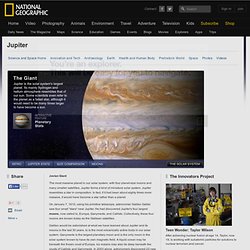
Jupiter resembles a star in composition. In fact, if it had been about eighty times more massive, it would have become a star rather than a planet. On January 7, 1610, using his primitive telescope, astronomer Galileo Galilei saw four small "stars" near Jupiter. He had discovered Jupiter's four largest moons, now called Io, Europa, Ganymede, and Callisto. Galileo would be astonished at what we have learned about Jupiter and its moons in the last 30 years. Jupiter's appearance is a tapestry of beautiful colors and atmospheric features. Atmosphere The composition of Jupiter's atmosphere is similar to that of the sun—mostly hydrogen and helium. Jupiter's enormous magnetic field is nearly 20,000 times as powerful as Earth's.
—Text courtesy NASA/JPL. Jupiter – Facts and Information about the Planet Jupiter. Jupiter is the largest planet in the solar system.
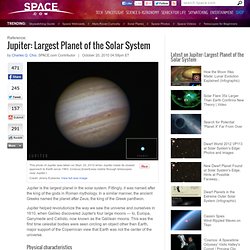
Fittingly, it was named after the king of the gods in Roman mythology. In a similar manner, the ancient Greeks named the planet after Zeus, the king of the Greek pantheon. Jupiter helped revolutionize the way we saw the universe and ourselves in 1610, when Galileo discovered Jupiter's four large moons — Io, Europa, Ganymede and Callisto, now known as the Galilean moons. This was the first time celestial bodies were seen circling an object other then Earth, major support of the Copernican view that Earth was not the center of the universe.
Physical characteristics. Jupiter. Jupiter means: Jupiter, known as Zeus in Greek mythology, over threw his father Saturn to become king of the gods.

He then split the universe with his brothers Neptune and Pluto. How much would you weigh on Jupiter? If you traveled to Jupiter on vacation, you would be very heavy. If you weigh 70 pounds (32 kg) on Earth, on Jupiter you would weigh 185 pounds (84 kg). This is because Jupiter is such a large planet and so has more gravity. Jupiter. Jupiter Still Has Water from 1994 Comet Crash. The stratosphere of Jupiter is filled with water delivered to the giant planet by a cataclysmic comet crash in 1994 that not only wowed scientists at the time, but spawned a legacy that is still delivering surprises today.
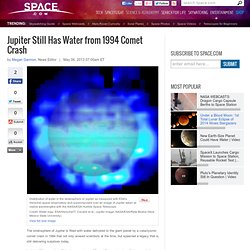
In July 1994, more than 20 broken-up pieces of Comet Shoemaker-Levy 9 slammed into Jupiter, captivating skywatchers and scientists alike. Now, new research reveals that the comet collision not only gave Jupiter scars big enough to be seen from small telescopes on Earth; the ice-filled comet also dropped loads of water onto the atmosphere of our solar system's biggest planet, scientists say. [See photos of Comet Shoemaker-Levy 9 hitting Jupiter] Jupiter vacuumed up the pieces of the disrupted comet Shoemaker–Levy 9 in 1994, but the impacts were a reminder of the danger faced by Earth. Credit: JPL/NASA/STScI Water vapor was first spotted in Jupiter's upper atmosphere by the European Space Agency's (ESA) Infrared Space Observatory in 1997. 0 of 10 questions complete.
Jupiter - 5th from sun. Jupiter l Jupiter facts, pictures and information. Jupiter is the fifth planet from the Sun and by far the largest.
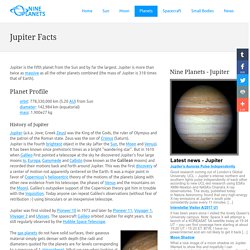
Jupiter is more than twice as massive as all the other planets combined (the mass of Jupiter is 318 times that of Earth). Planet Profile orbit: 778,330,000 km (5.20 AU) from Sundiameter: 142,984 km (equatorial)mass: 1.900e27 kg History of Jupiter Jupiter (a.k.a. Jupiter is the fourth brightest object in the sky (after the Sun, the Moon and Venus). Jupiter was first visited by Pioneer 10 in 1973 and later by Pioneer 11, Voyager 1, Voyager 2 and Ulysses. The gas planets do not have solid surfaces, their gaseous material simply gets denser with depth (the radii and diameters quoted for the planets are for levels corresponding to a pressure of 1 atmosphere). Jupiter is about 90% hydrogen and 10% helium (by numbers of atoms, 75/25% by mass) with traces of methane, water, ammonia and "rock".
What the storm can do. Size of jupiter. Why is jupiter a Gas giants. Planet Facts. Jupiter is the largest planet in the solar system, but it spins very quickly on its axis.
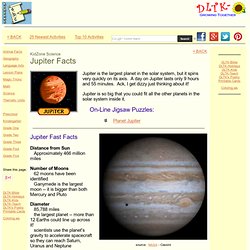
A day on Jupiter lasts only 9 hours and 55 minutes. Ack, I get dizzy just thinking about it! Jupiter is so big that you could fit all the other planets in the solar system inside it. On-Line Jigsaw Puzzles: Interesting Facts About Jupiter. Want to stay on top of all the space news?
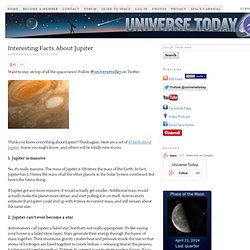
Follow @universetoday on Twitter Think you know everything about Jupiter? Think again. Here are a set of 10 facts about Jupiter. Some you might know, and others will be totally new to you. 1. No, it’s really massive. If Jupiter got any more massive, it would actually get smaller. 2. Astronomers call Jupiter a failed star, but that’s not really appropriate. 3.